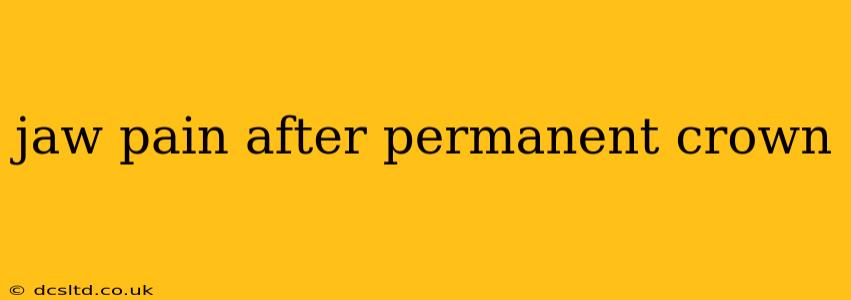Experiencing jaw pain after getting a permanent crown is understandably concerning. While many patients find the procedure straightforward, some experience post-procedure discomfort, ranging from mild soreness to significant pain. This comprehensive guide explores the potential causes of jaw pain following crown placement, effective treatment options, and preventative measures to help you understand and manage this issue.
What Causes Jaw Pain After Getting a Permanent Crown?
Several factors can contribute to jaw pain after receiving a permanent crown. Understanding these causes is crucial for appropriate diagnosis and treatment.
-
Improper Bite: A poorly fitted crown can alter your bite, leading to uneven pressure on your jaw joint (temporomandibular joint or TMJ). This misalignment can cause pain, clicking, and even locking of the jaw. This is a common culprit.
-
Inflammation: The procedure itself can cause temporary inflammation of the gums and surrounding tissues. This inflammation can radiate pain to the jaw.
-
Sinus Issues: In some cases, particularly with upper molars, the crown might inadvertently irritate the sinuses, causing referred pain to the jaw.
-
Underlying TMJ Disorder: Pre-existing TMJ problems might be exacerbated by the crown placement, leading to increased jaw pain. The crown might highlight a pre-existing issue.
-
Muscle Strain: The stress and tension related to the procedure, or even anxiety about it, can lead to muscle strain in the jaw and surrounding areas.
-
Infection: While less common, an infection at the crown site can cause significant jaw pain and swelling. This is a serious complication requiring prompt dental attention.
Why Does My Jaw Hurt After a New Crown? (Addressing common concerns)
This section directly addresses frequently asked questions related to jaw pain post-crown placement, providing clarity and reassurance.
Is jaw pain after a crown normal?
Some mild discomfort or soreness is considered normal in the immediate aftermath of crown placement. However, persistent or severe pain is not. If you're experiencing significant jaw pain, consult your dentist.
How long does jaw pain last after a crown?
The duration of jaw pain varies depending on the cause. Mild soreness might resolve within a few days, while pain caused by a misaligned bite or other underlying issues could last longer. If pain persists beyond a week or worsens, seek professional help.
Can a crown cause TMJ problems?
While not always the case, a poorly fitted or improperly positioned crown can exacerbate pre-existing TMJ problems or even contribute to the development of new ones. It's essential to have a properly fitted crown to prevent or minimize TMJ issues.
What should I do if I have jaw pain after a crown?
If you experience jaw pain after crown placement, contact your dentist immediately. They can assess the situation, identify the underlying cause, and recommend appropriate treatment. Avoid self-treating.
Treatment Options for Jaw Pain After a Crown
Treatment for jaw pain following crown placement depends on the underlying cause. Options include:
-
Adjustments to the Crown: If the pain is due to a misaligned bite, your dentist may need to adjust the crown to improve its fit.
-
Pain Medication: Over-the-counter pain relievers like ibuprofen or acetaminophen can help manage mild to moderate pain.
-
Anti-inflammatory Medications: These medications can help reduce inflammation and alleviate associated pain.
-
Muscle Relaxants: If muscle strain is a contributing factor, your dentist might prescribe muscle relaxants to relieve jaw tension.
-
TMJ Therapy: For TMJ-related pain, your dentist might recommend physical therapy, splints, or other TMJ therapies.
-
Root Canal (if infection is suspected): In the case of infection, root canal treatment may be necessary.
Preventing Jaw Pain After Crown Placement
Taking preventative measures can significantly reduce the risk of jaw pain after crown placement. These steps include:
-
Choosing an Experienced Dentist: Opt for a qualified and experienced dentist known for their meticulous work.
-
Thorough Examination and Planning: Ensure your dentist conducts a comprehensive examination and treatment planning before crown placement.
-
Proper Bite Analysis: A precise bite analysis is crucial to ensure the crown fits correctly and doesn't interfere with your bite.
-
Follow Post-Procedure Instructions Carefully: Adherence to post-operative instructions is vital for proper healing and minimizing complications.
-
Maintain Good Oral Hygiene: Practicing excellent oral hygiene helps prevent infections and promotes healthy gum tissue.
By understanding the potential causes, treatment options, and preventative measures, you can significantly improve your chances of a comfortable and successful crown placement experience. Remember, timely intervention from your dentist is crucial in addressing any jaw pain that arises after a permanent crown is fitted. Don't hesitate to contact them if you experience any concerning symptoms.
